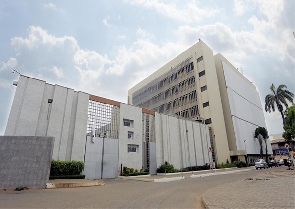The latest summary of economic and financial data released at the weekend by the Bank of Ghana ahead of its scheduled announcement of its benchmark Monetary Policy Rate for the next two months reveals that although has navigated the inevitable stresses imposed by COVID 19 so far, it is still having to cope with severe challenges which bring a cloud of uncertainty over macro-economic performance expectations for 2021.
Much of the data released last week have been in the public domain since the 2021 budget proposals were presented to parliament on March 12, but the most sought after statistic is still not yet available: Ghana’s full-year macroeconomic growth for 2020 which is still being awaited from the Ghana Statistical Service.
Ghana was officially in recession by the second half of last year following two successive quarters of economic contraction; by 3.2 percent for the second quarter of the year and 1.1 percent for the third quarter.
However, the central bank’s Composite Index of Economic Activity points towards the beginning of an economic rebound in the last quarter of the year.
Year on year the CIEA, in real terms, increased by 13.9 percent in February this year, its strongest showing in more than a year, easily bettering the 7.1 percent growth it experienced over the previous 12 month period up to February 2020, just before COVID 19 arrived in Ghana and threw the economy askew.
Over the 12 months up to May 2020 the CIEA declined by a record 10.2 percent and this translated into the 3.2 percent contraction the economy suffered during the second quarter of the year. The latest reading therefore is widely expected to herald a return to economic growth for the last quarter of 2020, or the first quarter of 2021 at the latest.
This has been underpinned by rising confidence on the parts of consumers and businesses alike according to the latest surveys conducted by the BoG.
By December last year the central bank’s consumer confidence index stood at 102.8, which is even higher than its level immediately prior to the coronavirus outbreak in Ghana of 97.1.
Similarly the business confidence index stood at 101.01 by year’s end, higher than the 97.9 it stood at just before the pandemic’s pall settled over Ghana.
However economists point out that both consumer and business confidence will most likely be adversely affected by the new taxes being proposed by government in its 2021 budget proposals although their effect will not be captured until the results of the next round of BoG surveys are unveiled in late May.
A dent on confidence will be intensified by the latest public debt data which reflects the cost of government’s eminently successful navigation of the COVID 19 pandemic’s health and economic threats.
By the end of 2020 the public debt had risen to GHc291.6 billion, up from GHc218.2 billion at the start of the year, this translating to an increase in the public debt to Gross Domestic Product ratio from 62.4 percent to 76.1 percent, well in excess of the generally accepted debt sustainability ceiling of 70 percent.
The cost of the financial sector clean up continues to rise and its impact on the debt to GDP ratio has become more significant than ever; during 2020 the cost of the financial sector resolution bonds with regards to the size of the public debt rose from GHc10.6 billion to GHc15.3 billion, this translating to 4.0 percent of GDP – without it Ghana would hardly be above the public debt sustainability ratio ceiling.
While the financial sector clean-up has secured the safety of deposits and the credibility of financial intermediation companies – at least the commercial banks – the rise in credit risk due to the impacts of COVID 19 has deprived the economy of its full benefits. Although banks are getting more deposits from banking public that has retained confidence in licensed deposit taking institutions, they have been investing more of these in government treasury securities than in loans to the private sector.
Indeed, in real terms (using constant 2018 prices) year on year credit growth to the private sector during the 12 months up to February 2021 was negative to the tune of 2.7 percent in a reversal of the 13.0 percent positive growth over the previous 12 month period.
On the upside though, monetary easing by the BoG coupled with government’s liquidity injections in the form of fiscal stimulus packages have lowered interest rates and thus the cost of business financing. Just as importantly, this has also cut government’s domestic debt servicing costs as well.
Over the 12 months from February 2020 to February 2021 the 91 day treasury bill rate has fallen from 14.71 percent to 13,55 percent; the 182 day bill rate from 15.17 percent to 14.00 percent; the 364 day bill rate from 17.81 percent to 16.91 percent; the two year note from 20.20 percent to 17.60 percent; and the three year bond from 20.75 percent to 19.25 percent.
On the secondary market, the yield on the 10 year bond has fallen from 20.49 percent to 19.15 percent; the 15 year bond from 20.54 percent to 19.12 percent; and the 20 year bond from 20.80 percent to 19.80 percent.
In similar fashion the interbank weighted average rate at which banks lend to each other – usually overnight or on 24 hour call – to smoothen out short term liquidity shortfalls has fallen to 13.56 percent since November 2020, down from 15.86 percent as at February last year.
In line with these declines the Ghana Reference Rate, which effectively serves as the base lending rate for all the banks has been 14.77 percent since the second half of last year down from 16.18 percent before the BoG began monetary easing to fend off the slump in economic activity imposed by COVID 19 and the requisite public policy measures instituted to curb its spread. Consequently the average lending rate charged by banks has fallen to 21.00 percent, down from 23.37 percent immediately prior to the implementation of the central bank’s monetary easing.
Six month fixed deposit rates have fallen on average too, from 11.50 percent as at February 2020 to 10.00 percent a year later. Interestingly though the average rate on three month fixed deposits has remained steady at 11.50 percent implying a general belief that inflation, and consequently interest rates, are headed for further falls during this year.
But while businesses and households alike are also taking solace from the cedi’s stability over the past year, there is cause for worry as the underlying merchandise trade surplus has been shrinking due to a combination of declining export revenues and a rising import bill.
In 2020 total exports amounted to US$14,471.5 million comprising in the main of US$6,799.1 million from gold; US$2,328.2 million from cocoa; and US$2,910.6 million from crude oil.
Total imports added up to US$12,428.6 million, comprising of US$1, 8905 in oil imports and US$10,538.0 million in non-oil imports. This left Ghana with a US$2043.0 million merchandise trade surplus, smaller than in the previous year but still enough to underpin cedi stability.
However the trade surplus continues to shrink. During the first two months of 2021, the trade surplus was just USS$339.7 million, much less than half of the US$791.0 million trade surplus generated during the corresponding period of 2020.
This creates worries that pressures could emanate on the cedi’s exchange rate. However economists point out that Ghana still has a positive overall balance of payments, its current account deficit of US$2,135.0 million overturned by a US$2,887.2 million positive balance in the capital and financial account. Consequently Ghana achieved a small, but crucial overall balance of payments surplus of US$368.0 million in 2020.
Even more importantly, Ghana’s gross international reserves remain close to their long term high. By the end of February this year they stood at US$8,719.7 million, up from US$8,624.4 million by the turn of the year, but below the US$10,036.8 million as the end of February 2020. This is enough to cover 4.1 months of imports, less than the 4.8 months import cover achieved a year ago but still well above the prudential target of 3.5 months import cover.
Ghana’s international reserves are in for a major boost as government concludes its virtual roadshow towards raising as much as US$5 billion in Eurobond proceeds imminently. Keeping in line with established policy part of this will be used to boost reserves which could go as high as US$1O billion again, even if only briefly.
All this means that Ghana’s external sector performance fundamentals remain strong despite the disruptions created by COVID 19.
Crucially, the Bank of Ghana’s strategy of doing forward foreign exchange auctions continues to ensure that the currency market is driven by those fundamentals rather than sheer speculation which in the past has tended to work against cedi exchange rate stability due to the actions of speculative currency traders looking for quick profits derived from buying dollars to hold and relying on their demand to increase the exchange rate.
Instructively, for the first time since the Bank of Ghana first introduced forward foreign exchange sales in October 2019, bids placed by banks on behalf of their customers fell short of the amount the central bank put up for sale at the most recent auction held on March 9.
This suggests that forex users are no longer worried that forex may become in short supply over the near future and therefore they simply no longer see the need to lock into purchases for near future delivery, even though the price premium on such forward sales are negligible as has been the case for fortnightly forward auctions over the past few months.
At the most recent forward auction there were only 40 bids, which cumulatively added up to demand for just US$33.750 million. This was well short of the US$50 million which the BoG was offering for sale as earlier announced in its auction calendar for 2021. Consequently the central bank accepted all the bids made, at the rates offered, which cumulatively added up to just 68 percent of the total amount offered.
Indeed, even the bids made were for the shortest tenors on offer: seven days, 15 days, 30 days and 45 days and more than half of the bids – 21 out of 40 bids in all – were for delivery in seven days, which is virtually akin to immediate use considered within the context of international trade timelines. Conversely, there were no bids at all for 60 days and 75 days delivery.
Bids made ranged between GHc5.6900 and GHc5.7450 for delivery in seven days; GHc5.6900 and GHc5.7414 for delivery in 15 days; GHc5.7139 and GHc5.7450 for delivery in 30 days and; GHc5.6921 and GHc5.6931 for delivery in 45 days. The BoG accepted all the bids at those same rates.
Although the results of the latest auctions suggest unprecedented confidence in the availability of forex at near current spot market rates, some cynics assert that this may be just a temporary phenomenon resulting from expectations of the market being flooded imminently as government prepares to do a historically large Eurobond issuance of up to US$5 billion.
This school of thought suggests that the new found confidence of forex users is therefore only temporary and they will return to bidding beyond available supply when the impending Eurobond proceeds have been used up.
But this is moot; even during usual auctions – where demand for forex exceeds supply – bids for all the various tenors have been very close to spot market rates.
Ghana’s latest economic data will be met with mixed feelings. The economy has performed well under the circumstances, the only dark spots being the fiscal deficit and the public debt level. But the problem is that those – along with the economic growth rate data still being awaited – are the most key performance indicators.
The upside is that the biggest economic management headaches are reserved for government itself. Interest rates are falling and the cedi remains relatively stable; two key factors that keep the operating environment for business attractive. It is government that has the responsibility to keep things that way despite an inordinate fiscal deficit and ballooning public debt.
The new taxes announced by government however are a sign that with the elections now won, it intends to share the burden more.
Business News of Monday, 22 March 2021
Source: goldstreetbusiness.com













